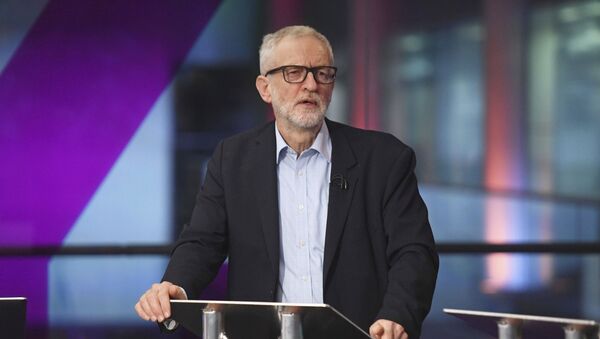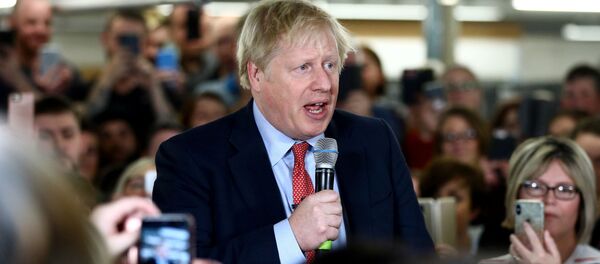Professor Alistair Jones from the Department of Politics at De Montfort University Leicester has shared his views on Labour's promises ahead of the December general election.
Sputnik: On Monday, the Labour Party’s, John McDonnell promised to deliver a budget to "end austerity" in a speech setting out Labour's priorities for its first 100 days in government. How significant is this statement and are these targets set by Labour possible?
Alistair Jones: This statement is quite profound. It has been flagged up throughout the entire campaign that Labour wants to end austerity, that they want to reinvigorate the public sector, because the public sector can actually drive the entire economy and so what they're wanting to do is find a way of taking it forward. There are a number of issues here, one of which is to what extent it is affordable, and what Labour have tried to do is to map out the numbers, but they have been questioned as to whether or not they are wholly viable.
Overall, the picture is that the state ought to be more actively involved in the economy as it had been throughout most of the Second World War period and that can drive the entire economy forward. Within this we see issues, in particular, around the green industry - trying to get the whole economy to be more environmentally friendly, especially noting the climate change emergency that has been declared. This is what McDonnell is trying to give more detail towards to highlight to the voters that it's not just "pie in the sky" and big pitches, it's actually trying to make it a bit more specific.
Sputnik: On the back of these announcements, we’ve seen the Conservatives repeatedly criticise where the funding for these policies will come from and that Labour will bankrupt the country. Will Labour bankrupt Britain with these policies? What effect would these policies have on Britain’s economy?
Alistair Jones: The idea that it will bankrupt the economy is "pie in the sky"; that is totally fictitious. What we actually see is with some of the planned renationalisation, it's not necessarily about buying out the company straight away; rather, it's simply not renewing the contracts when they come up for renewal. So we'll see a gradual renationalisation of the railways, which will cost a lot less than anticipated.
What must also be borne in mind with each of these nationalisations is that in doing so, that will bring more revenue back to the government as well. If you look at the train industry as being the best example of this, there are huge subsidies that are still given out to all of the private sector companies that are busy delivering the rail service and some of them still struggle to make a profit.
It does involve a great deal of risk, but at the same time no more risk than a private company doing these services and then failing, as we've seen with, for example, a number of academies around the country, which have failed, and then the public sectors have had to come in - local councils have to come back in to bail the school's out and all the money that has been invested has disappeared. What we're going to be seeing is a more transparent system that is broadly affordable and will be funded, in part at least, by taxes on the most wealthy.
One of the scaremongering things that we've seen in all this is there's going to be higher taxes. Yes, it will be higher taxes for the top, probably 5% at most, maybe even less than that in the population. The vast majority of the public, according to Labour's plans, are not going to see an increase in taxation.
Sputnik: With four days to go before Britons head to the polls, will these statements and Labour’s policy commitments help the party’s performance and equally encourage voters to vote tactically?
Alistair Jones: I think this message is aimed more at Labour waverers - those people who are thinking "well I want Brexit to be done. I'm not sure about Jeremy Corbyn, but I don't like Boris Johnson". These people, they're trying to say to them; here is a strategy, here are thoughts that are going to help the country and they're going to help you.
They're trying to target the waverers of their own base. Now the knock-on effect of that is if this is successful, some of those marginal constituencies that the Conservatives have been targeting in the belief that they can win them may actually stay in Labour hands.
Making predictions on general elections is a fool's game, but my feeling at the moment is that we are likely to see a Conservative government with a small majority, potentially single figures, I would say not more than 20, but there is a huge caveat to that.
We've also heard rumours that Boris Johnson's seat is suddenly looking a little bit insecure, because the local Labour candidate has been working his socks off trying to persuade people that he can represent the people of South Ruislip and Uxbridge far better than Boris Johnson will do and Boris Johnson has not been turning up to any of the hustings meetings there.
So we may see in individual constituencies significant changes that fly in the face of national swings, but overall, if all the swings stay uniform, then we are looking at a Conservative majority government; but there is still the possibility, though it is becoming a little bit more remote, of a hung Parliament and then we're back to where we were beforehand - where we have a hung Parliament, no government able to form a majority, and Brexit not being done.






